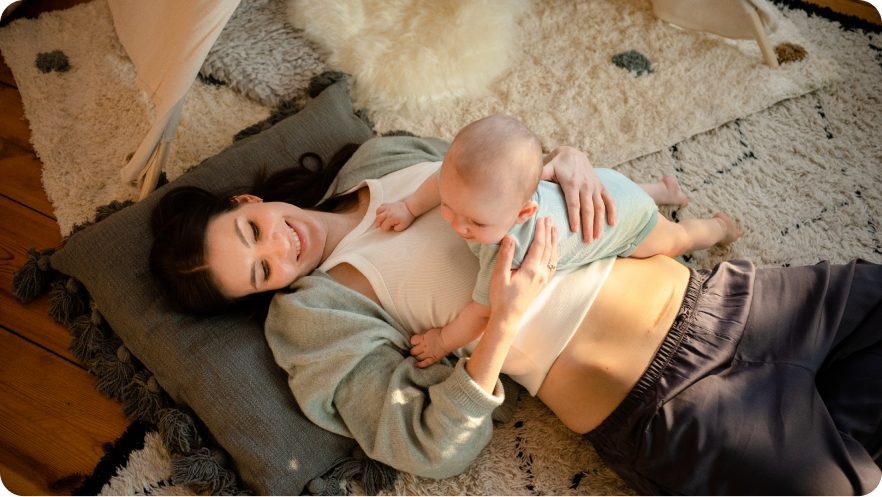- Create opportunities, rituals and alone time for the father and child
- Remove distractions and parent mindfully
- Avoid “maternal gatekeeping” and accept differences and mistakes
Helping your child bond with Dad

Key points
There is much conversation around the bonds between mothers and their babies, but what about dads? How can they establish their own special connection with your little one? Here, we’ll outline some practical ways to get dads (or other parents) involved in parenting (and build lifelong bonds in the process).
Create opportunity
Part of developing a close parental bond involves spending one-on-one time with your child – and that’s true of both you and your partner. Look for opportunities to divvy up parental responsibilities to create this time.
Feeding is the perfect activity where the father can spend quality time with their child. If your little one isn’t on solids yet, try giving your partner the opportunity to bottle-feed with expressed breastmilk or formula.
Creating the space for each parent to spend alone time with their child will help establish a close bond, which is beneficial for everyone. One study that looked at long-term studies of fathers’ involvement with their children concluded that a dad’s willingness to actively engage in parenting is associated with positive social, psychological and behavioural outcomes in later life.
Remove distractions
Try to keep engaged with the present while spending time with your little one, and encourage your partner to do the same. We’re often taught that multitasking is the key to success, but the fact of the matter is we’re simply not very good at it. Research shows the brain doesn’t actually do tasks simultaneously. Instead, it switches focus between tasks rapidly, which is less efficient, can lead to more mistakes and ultimately saps our energy.
When your partner is interacting with your child, try to remove distractions like phones and computers to give them both space to connect.
Parent mindfully
Building on this, the psychological process of mindfulness – the process of guiding your attention to the present moment – is as applicable to parenting as other areas of our lives. Studies have shown that children of individuals who practise mindful parenting are more likely to engage in prosocial activities (like sharing toys).
Practically, mindful parenting involves responding instead of reacting to your child. This means taking the time to interrupt your thought processes, centring your attention and then dealing with the situation at hand. For example, if your little one spills their drink, slowly count to five before reacting. Doing so provides a “circuit break” for your instinctive reaction and gives time to reframe.
If you’re interested in exploring mindful parenting further, Headspace has some great resources available.
Let your partner find their own way
There’s significant societal pressure for mothers to take the lead when it comes to caring for children. Sometimes, this tendency can become problematic. “Maternal gatekeeping” occurs when a dad feels as though their contact with their child is mitigated by the mother, or when their confidence in parenting is undermined by the perception they’re doing things the “wrong” way.
In a study that looked at parental interactions with children over a six-month period, researchers found fathers who felt as though their partners took over from them were less engaged with their children six months later. On the other hand, research has demonstrated that modern fathers’ attitudes towards parenting are shifting as our cultural perspective of masculinity evolves.
To avoid perceptions of gatekeeping, strive for open and honest communication that provides space for each parent to try things their own way – and remember, as elsewhere in life, mistakes are bound to happen.
Related pages

Get in touch with our Careline experts
When your little one is unhappy or unwell you want reliable support from a trusted source. Our Careline team of nutritionists, dietitians and midwives specialise in infant and child health, offering free nutrition, feeding and product information.
Every feeding journey is unique
Not every parent can produce breast milk. No matter what choice you make, we will support your unique feeding journey.
We at Nutricia believe in providing the best nutrition for babies, which is why we recognise breast milk is uniquely superior for babies as it provides many benefits. It is important that mums have a healthy diet to support breastfeeding. A decision not to breastfeed, or partial bottle feed, may reduce breast milk supply making it difficult to reverse. The cost and social implications of using feeding methods should be considered. Always seek professional advice about feeding your baby. Ensure formula is used as directed as improper use can affect baby’s health.
REMEMBER: The information on this page is general only. If you have any concerns about your baby’s poo or questions about constipation or any other health concerns, please speak to a healthcare professional, like a Pharmacist, GP or Maternal Child Health Nurse.



